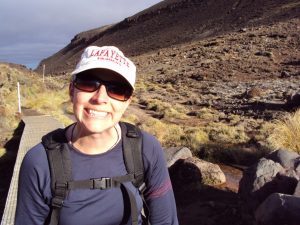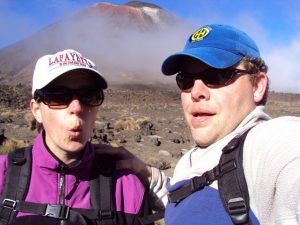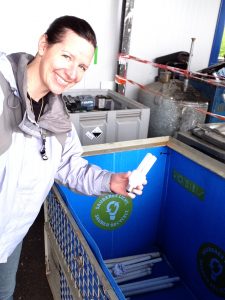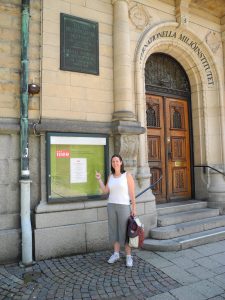Jessika Luth Richter – 2001
Jessika Luth Richter 2001

Jessika in New Zealand
I’ve always been interested in environmental topics, but didn’t have too much exposure to Geology (other than collecting rocks as a kid) until I took the Environmental Geology introductory course at Lafayette. I took it to fulfill the science requirement, which wasn’t much since I was a History major. However, I enjoyed the course so much that I decided to pursue a double major in Geology and History.
At the moment I am in the middle of my PhD in the field of Environmental Policy at Lund University in Sweden. More specifically I am looking at circular economy policies for low carbon technologies, mainly energy-efficient lighting and solar panel products. These technologies are made with quite a few critical materials that are of interest for reuse and recycling. While the end-of-life phase of products is a particular niche, it has been really good to have a geology background because you also need to understand about these materials and where they come from as well to really understand the full value chain. I have been in Sweden now for nearly 5 years and live here with my German husband and my 1 year old son.
After graduating from Lafayette I first worked as a park ranger it Lake Roosevelt National Recreation Area in Washington. It was fantastic, but also seasonal. I found that I enjoyed the teaching aspects of the job the most. I also really wanted to return to Australia, where I studied a semester in college. So I moved to Melbourne and studied a one year programme to gain a graduate diploma in teaching. My main subjects were Year 9 general Science, History, Geography and SOSE (Studies of Society and Environment), but in reality I got

Jessika and husband in New Zealand
to teach a little of everything. The Year 9 programme at the school where I taught had a unique programme where Physical Geography was taught through 10 day camps in which one teacher and one outdoor guide accompanied 15 students for ten days of backpacking, canoeing, or something of that nature. It was a fantastic way to teach and learn. After a few years of teaching, I decided to use my teaching degree to do some teaching in other parts of the world and set off for Vietnam, Nepal and the UK. Along the way I also met my future husband.
In Australia I had also become increasingly involved in local environmental groups and wanted to work more directly in this area. So when I returned I started Law School at the University of Melbourne with a view to becoming an environmental lawyer. In the end though, I put this on hold while I moved to New Zealand (to marry my boyfriend). Still wanting to continue my studies, but realizing law probably didn’t mesh with traipsing around the world, I decided to study Environmental Management and Policy in Sweden. Long story short, I am still studying it, but now in a PhD, and still in Sweden as there is a lot of progressive environmental policy examples here. I am also teaching in undergraduate and Masters programs, helping with our Massive Open Online Courses (MOOCs – on Coursera), and completing my PhD research. In the end, this was a really good decision because I am learning about environmental policy and how to research it on a much deeper level, but still using the skills I gained through the years of teaching. There is a nice mix of activities involved in a job in academia that really suit me.

Jessika “highlighting” recycling options
I was a Marquis Scholar at Lafayette and I remember that programme was great with activities and events for us in Boston, New York, etc. I am from California so a big part of the Lafayette experience for me was living and learning about life on the East Coast. I was also a member of the Lafayette swim team for four years as well as the History and Outdoor clubs.
The semester abroad in Australia was life-changing, motivating me to live there and other countries after college. However, the small classes at Lafayette meant I not only learned well, but also got to know the professors there. This has also been great as with all the changes in my life path, I’ve still kept in touch with my Lafayette professors (Dru Germanoski and D.C. Jackson in particular but also Larry Malinconico and Kathryn Schubel), and they were always there for me when I needed advice and recommendations.
People sometimes remark that I’ve had a pretty curly career path, but that might be the way it works out if you are a person who follows their interests and enjoys

Jessika at the
The International Institute for Industrial Environmental Economics at Lund University
continuously learning and being challenged. In some ways I think a PhD would have been easier in a straight path from undergrad, but for me personally, it was good to have worked and traveled first. It has certainly made life interesting!
Don’t feel like you are locked into the first career you choose. Having an open and curious mind can lead to really great opportunities.
If students are interested in environmental management or policy, our Institute has MOOCs on a couple of subjects (and are making more) that explore these. We try to have a wide focus and include interviews and cases with businesses and government that can also give an indication of careers in this field. Greening the Economy: Lessons from Scandinavia – Lund University | Coursera and my Institute website also has information about Masters, PhD and research at the IIIEE.